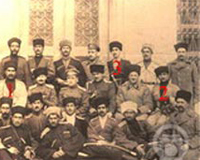Major general Iraj Matbui, son of Lieutenant Hassan Agha, was born in 1895. He followed military career as his father and when graduated from the Cossack cadet school, he went to Russia to continue his training. On his return, he joined the Cossack forces and accompanied Reza Khan in his 1921 coup in Tehran...
Major general Iraj Matbui, son of Lieutenant Hassan Agha, was born in 1895. He followed military career as his father and when graduated from the Cossack cadet school, he went to Russia to continue his training. On his return, he joined the Cossack forces and accompanied Reza Khan in his 1921 coup in Tehran.
Soon he was promoted and became colonel and the deputy commandant of Khorassan division and in 1925 became commandant of the division as a brigadier general. In the same year, there was some resistance demonstrated by people against the manifests of modernization such as, removal of veils and uniformity of cloths and type of hats to be worn. But the support given by the people led the orders to be cancelled. The Khorassan clerics managed some speeches against this order and Sheikh Bohlul delivered a strong speech against it. The government of Khorassan was terrified by the gathering of people; and in order to prevent this they consulted Tehran. Reza Shah ordered for the crack down of the gathering. The East division commanded by brigadier general Matbui was to siege and shoot to the demonstrators.
The number of the dead and the injured were reported close to two thousand people. Following this many directors of Khorassan offices were removed. However, brigadier general Matbui became major general and the commandant of Tabriz third division and remained in this rank until 1941. In mid September 1941, the Soviet forces invaded Azerbaijan. But he did not take it serious. But following the air attack of the Soviets toTabriz, he moved his family to Tehran and he preferred to retreat from Tabriz instead of resistance. In the aftermath of September 1941, he was put to trial in a military court and was retired. Again he was invited to army and became the head of procurement office.
He was a selected senator of Tehran for six periods. He was arrested after the Islamic revolution and was executed in 24th Sept, 1979 for crack down and extermination of the protesters in Goharshad mosque.
https://iichs.ir/vdch.vnzt23nq-10d2.html
iichs.ir/vdch.vnzt23nq-10d2.html
